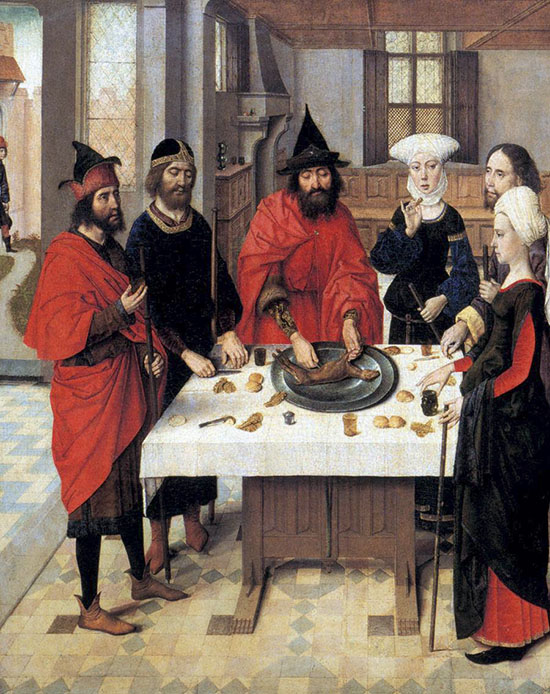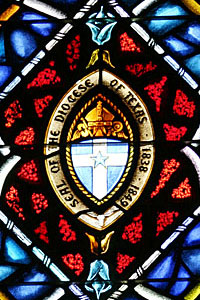

Exodus 3:4 "...And Moses said, 'Here I am.'"
Prime Timers, a St. Martin's Adult Christian Education (A.C.E.) group, also known as an A.B.F. (Adult Bible Fellowship), is for people in the Prime of Life, age 50 and beyond. Class meets in the Parlor near the Church Offices each Sunday from 10:15 am to 11:00. We are following a course of study from the United Council of Churches titled Call Sealed with a Promise. You are invited to join our group as we begin a new unit titled "Called Out of Egypt" and spend some time with us studying the Old Testament.
The Passover Feast

Dieric the Elder Bouts, The Feast of the Passover, 1464-67, Oil on panel, Sint-Pieterskerk, Leuven, Belgium.
Prime Timers Celebrate Good News!
We celebrate our members Good News at Prime Timers with a $1 contribution to Henny Penny, our Good News chicken. Periodically Henny donates the money she collects to a charity, currently the Amistad Mission in Bolivia. Our eternal optimist Lynn, recovering from dental surgery, gave thanks for being alive! Also, her daughter is in town. Oakley prayed for rain! Amen.
Lynn and the class decided our next dinner night will occur Tuesday, July 21, at our usual time, 6:30pm, at the Pronto Cucinino, 1401 Montrose, 713-528-8646. This is an Italian restaurant on Montrose, in between West Dallas and West Gray. Give Lynn a call, (281) 495-3832, if you would like to come so she can get a head count.
God Calls People to Remember
Carol Hartland led the Prime Timers this morning with a reading from
Paul's letter in 1 Corinthians 5:1-8: 1It is
actually reported that there is sexual immorality among you, and of a kind
that does not occur even among pagans: A man has his father's wife.
2And you are proud! Shouldn't you rather have been
filled with grief and have put out of your fellowship the man who did this?
3Even though I am not physically present, I am
with you in spirit. And I have already passed judgment on the one who did
this, just as if I were present. 4When you are
assembled in the name of our Lord Jesus and I am with you in spirit, and the
power of our Lord Jesus is present, 5hand this
man over to Satan, so that the sinful nature may be destroyed and his spirit
saved on the day of the Lord.
6Your boasting is not good. Don't you
know that a little yeast works through the whole batch of dough?
7Get rid of the old yeast that you may be a new batch
without yeast—as you really are. For Christ, our Passover lamb, has been
sacrificed. 8Therefore let us keep the
Festival, not with the old yeast, the yeast of malice and wickedness, but
with bread without yeast, the bread of sincerity and truth.
Carol called this a "light" lesson, one that focuses on one point and leaves most of the discussion to you. The reading for today begins mentioning the month of Abib, and Carol explained that this refers to March and April. The term "Passover" might refer to the night before the Israelites escaped, when the angel of death "passed over" residences that had doorposts sprinkled with lamb's blood. Other scholars suggest that it could be the "passing over" of one agricultural year to the next. Still another explanation is a Hebrew root meaning "protect" that is spelled differently from, but sounds the same as, the word for the angel's "passing over" their houses. Today all these meanings are combined: the theme of God's deliverance and protection, Israel's beginnings as a nation, and the start of a new agricultural season.
Carol came up with a "word of the day" from our class lesson material. It calls Passover an "anamnestic" celebration. Carol could not find this word in her dictionary, and in fact it is used more in medical terminology, referring to antibodies that "ramp up" production in the presence of a returning invading pathogen, even though all traces of it are gone from the body. In our case anamnestic is associated with memory, the Israelites remembrance of who they are as a people, and what God did for them.
This led a class member to mention he had read that only of small portion of Jews still celebrate Passover. Another brought up the book "Betrayed!" by Stan Telchin, about a Jewish family whose daughter one day accepts Jesus as her savior, and the spiritual journey they go through. Another member suggested that while some people are upset that Christmas is more of a secular holiday today and want to "put Christ back in Christmas," as a holiday that is observed by many people around the world in the spirit of giving, it is Christianity at it's best.
Carol enumerated some of the "feasts" celebrated by religions in remembrance of important events. In the Jewish faith you have Rosh ha-Shanah, the Feast of Tabernacles, Purim, Passover, Hanukkah, and Shavuot. Muslims have a variety of feasts depending on location, the most widely celebrated are the little and great feasts following the fast of Ramadan and the feast commemorating the birth of Muhammad. In Buddhist countries festive celebrations are usually associated with the birthday of Buddha, his attainment of Nirvana, or enlightenment, and his death.
In the Episcopal Church we have seven major feasts, Easter, Ascension on the fortieth day of Easter and Pentecost, marking the conclusion of the fifty days of Easter. These are followed by Trinity Sunday. Next is All Saints' Day, Christmas and Epiphany, celebrated on January 6, the day Christ was baptised.
Class members kept veering from the remembrance of who we are to the sad state of religion in the world. George sees it as the God of Mammon taking over. Others pointed out how difficult it is to "stay focused on the spiritual." In Pakistan there is an educational program designed to guide children away from the lure of the Taliban and their terrorist answers. Some countries place your religious affiliation on an identity card, and if you are in the "wrong" religion you can be in serious trouble. Carol fretted on how the media can distort messages. In some places the media is referred to as "the circus."
So toss out the "old yeast," stay focused on what is meaningful, and share your commitment to Jesus with others.
Carol concluded class with this benediction: "We hear your call, O God, and ask that you send us forth empowered by your Spirit to live and serve as your covenant people."
The Lesson for Sunday,
July 19th, is "God Calls People to Special Service"
Key Verse: Leviticus 8:12
Focus of the Lesson: Some individuals in a community
are set aside for special service to the community. How do we discern,
acknowledge, and affirm those people chosen for special service? God
commanded that Aaron and his sons be recognized by consecrating them with
water and holy garments.
The reading is Leviticus 8:1-13. This text is from the
New International Version. (NIV)
1The LORD said to Moses, 2"Bring Aaron
and his sons, their garments, the anointing oil, the bull for the sin
offering, the two rams and the basket containing bread made without yeast,
3and gather the entire assembly at the entrance to the Tent of
Meeting." 4Moses did as the LORD commanded him, and the assembly
gathered at the entrance to the Tent of Meeting.
5Moses said to the assembly, "This is what the LORD has
commanded to be done." 6Then Moses brought Aaron and his sons
forward and washed them with water. 7He put the tunic on Aaron,
tied the sash around him, clothed him with the robe and put the ephod on
him. He also tied the ephod to him by its skillfully woven waistband; so it
was fastened on him. 8He placed the breastpiece on him and put
the Urim and Thummim in the breastpiece. 9Then he placed the
turban on Aaron's head and set the gold plate, the sacred diadem, on the
front of it, as the LORD commanded Moses.
10Then Moses took the anointing oil and anointed the
tabernacle and everything in it, and so consecrated them. 11He
sprinkled some of the oil on the altar seven times, anointing the altar and
all its utensils and the basin with its stand, to consecrate them. 12He
poured some of the anointing oil on Aaron's head and anointed him to
consecrate him. 13Then he brought Aaron's sons forward,
put tunics on them, tied sashes around them and put headbands on them, as
the LORD commanded Moses.
St. Martin's Episcopal Church | 717 Sage Road | Houston, TX 77056-2199 | 713-621-3040 | fax 713-622-5701

